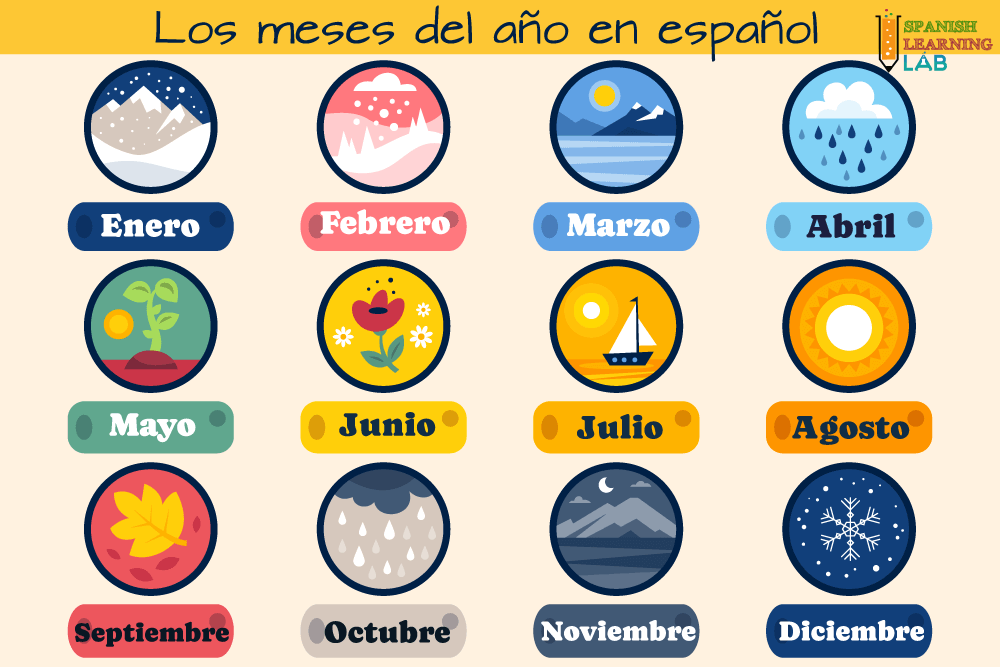In the previous lesson, we learned the days of the week. In this one, we will learn how to write, pronounce and use the vocabulary for months of the year in Spanish. We prepared several basic conversations with some important questions and expressions using the months. You will also have the chance to practice with a listening activity on people talking about the months in Spanish, and test yourself with two quizzes.

Introductory video: The 12 months of the year in Spanish
First, we will watch a video including the twelve months of the year in Spanish. Each picture in the video includes an expression related to each month, some of which you will also see in the conversations later. Pay attention to the way the months are written and pronounced in Spanish, and make sure to stick until the end of the video so that you can understand the rest of the lesson more easily.
How to write and say the months in Spanish
How to write months in Spanish
The twelve months of the year in Spanish are: enero, febrero, marzo, abril, mayo, junio, julio, agosto, septiembre, octubre, noviembre y diciembre. As you can see, they are written similarly in both languages. Know that you should not capitalize months in Spanish unless they are the subject of the sentence, for example:
- “Enero es el primer mes del año” (January is the first month of the year)
- “Estamos en enero” (We are in January)
Unlike days of the week, there is no need of articles like EL before months in Spanish.
“What month…?” in Spanish
There are several possible questions regarding months in Spanish. Some important questions we often ask about months are:
- ¿Qué mes es este? (what month is this?)
- ¿Cuál es tu mes favorito? (what is your favorite month?)
- ¿En que mes es tu cumpleaños? (what month is your birthday?).
One of the most common ones is “¿En qué mes…?”, the equivalent to “what month…?” in Spanish. The preposition EN will be used before the word QUÉ in the question, and we will need it for the answer as well, for example: “¿En qué mes es? – Es en enero”. Notice that SER will be the main verb in these types of sentences or questions. Listen to the first two conversations using months of the year in Spanish and identify other interesting questions and phrases.
Example No. 1
- Josie: ¿Cuántos meses hay en un año?
- Alex: Un año tiene 12 meses
- Josie: Veamos si sabes ¿Cuál es el primer mes del año?
- Alex: Eso es fácil. Es enero.
Example No. 2
- Josie: ¿En qué mes es tu cumpleaños?
- Alex: Buena pregunta. Es en noviembre. ¿En qué mes es el tuyo?
- Josie: Es el próximo mes, en agosto.
“My favorite month…” in Spanish
In order to say the month we are in, we can use “Estamos en + mes” as in “Estamos en diciembre”. As you can see, ESTAR will be the main verb in this phrase and will be conjugated as ESTAMOS when referring to months. To talk about your favorite months in Spanish, you can use “Mi mes favorito es + mes” as in “Mi mes favorito es junio”. You can add a reason why you like a month using the word PORQUE as in “Mi mes favorito es junio porque llueve”. As you can see, the main verbs for all these expressions and questions are SER and ESTAR.
Another way to talk about the months of the year in Spanish is by using the phrases “El mes de…” (the month) or “Los meses de…” (the months). This is very useful when describing the weather or events in a particular month along with adjectives, for example:
- “El mes de junio es cálido” (June is a hot month)
- “Las ofertas son en los meses de noviembre y diciembre” (There are offers in the months of November and December).
Listen to two more conversations with the months of the year in Spanish and try to find other useful expressions.
Example No. 3
- Alex: Febrero es un mes muy helado ¿no crees?
- Josie: Sí, es bastante helado. Creo que el clima de mayo es más agradable.
- Alex: Junio y julio son un poco calientes por aquí, ¿verdad?
- Josie: Sí, así es. El clima es diferente todos los meses.
Example No. 4
- Josie: ¿Cuál es tu mes favorito del año?
- Alex: Mi mes favorito es diciembre
- Josie: ¿Por qué?
- Alex: Por la navidad. ¿Cuál es el tuyo?
- Josie: Me gusta abril por las flores hermosas y octubre por las hojas de colores vistosos
- Alex: Creo que cada mes del año tiene algo especial.
Listening Activity No. 1: Talking about the months in Spanish
Key expressions in the conversation:
- ¡El tiempo vuela! means “Time flies!”
- A propósito means “By the way”
- ¿No crees que…? means “Don´t you think that….?”
Listening Activity No.2: Practicing phrases with months in Spanish
We hope that you got the best out of this lesson. ¡Hasta la próxima!
Related Spanish Worksheets:
- Days and Months in Spanish – PDF Worksheet
- Months of the Year and the Weather in Spanish – Dialogues in PDF

cumpleaños= Birthday
Si, cumpleaños significa Birthday en español…
Me gusta = I like